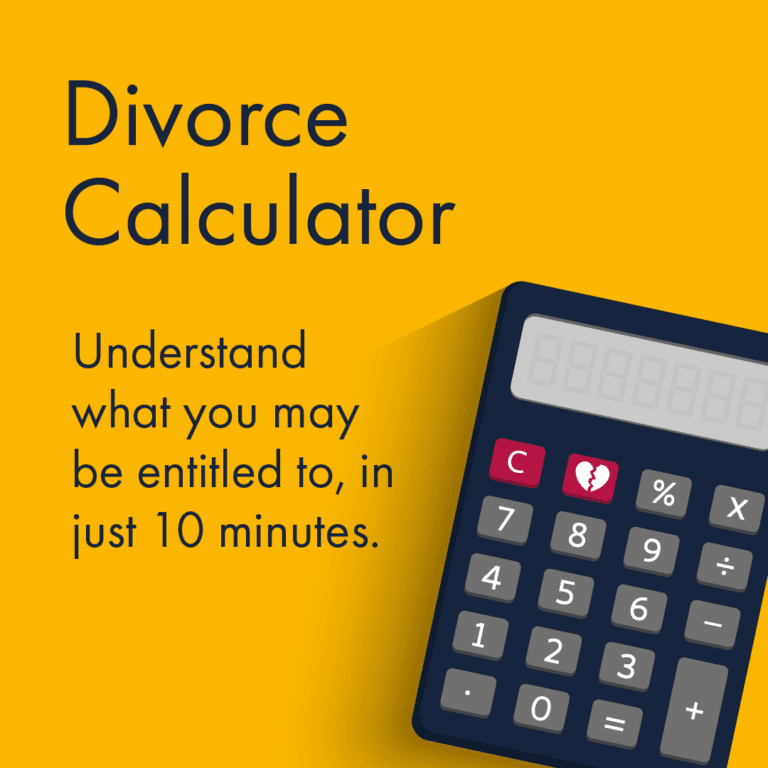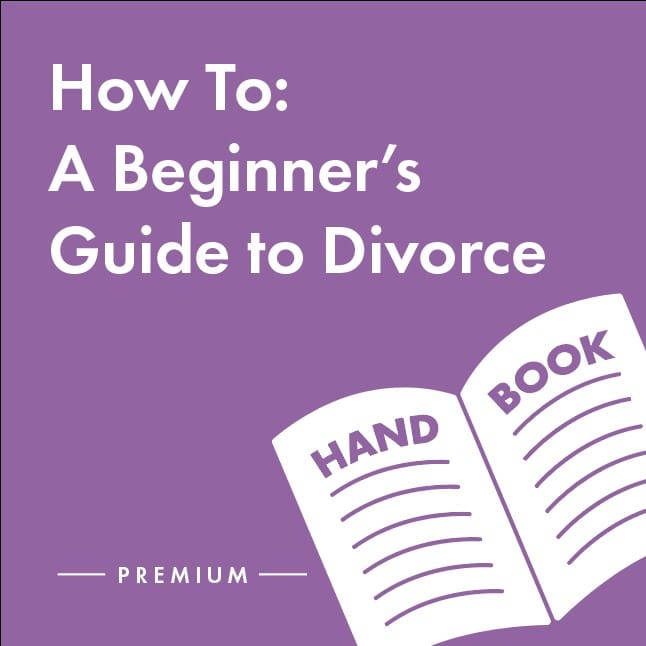 Use the calculator
Use the calculator
What is a final order of divorce?
A final order of divorce is the legal document that officially ends your marriage. Once it is granted, your divorce is legally recognised, meaning that your marital obligations and legal ties are officially severed. After receiving the final order, you are free to remarry, and any financial settlements agreed upon between the parties can be enforced if necessary.
Without the final order, even if you have gone through the earlier stages of the divorce process, you are still legally married. This is a crucial point as it may affect your rights, such as inheritance rights or pension entitlements, if your spouse were to pass away before the divorce is finalised.
Has it always been known as the final order of divorce?
This final divorce order was previously known as a decree absolute. With the Divorce, Dissolution and Separation Act 2020, which also saw the introduction of no-fault divorce in England and Wales, the terminology was updated to make this final step clearer for all parties.
Along with the final divorce order, there’s another main order that is made during divorce proceedings: the conditional order, which was known as the decree nisi. The conditional order is confirmation from the court that it sees no reason why the marriage cannot be dissolved. This order is needed before the final order of divorce can be issued.
-
How long does a final order take once applied for?
When the applicant sends the final order application to the court, the court should process and pronounce it the same day, though it usually takes two-to-three weeks for you to receive the legal document that will dissolve your marriage. Spouses are only legally divorced once the final order has been pronounced.
If more than a year has passed since the pronouncement of the conditional order, the application is slightly more involved.
-
Who can apply for the final order of divorce?
In most cases, either spouse can apply for the final order of divorce once the court has issued the conditional order. Under the Divorce, Dissolution and Separation Act 2020, both parties can now jointly apply for divorce. Prior to the Act, it was a requirement to petition for divorce. This update means that either party could apply for the final divorce order if they initiated the divorce as a sole applicant or jointly if both parties applied for the divorce together.
If the applicant for the divorce does not apply for the final order, the respondent can apply for it. However, the respondent must wait three months after the date that the applicant was able to make the application for the final divorce order.
-
Why would the applicant delay their application?
There are several reasons why the applicant might want to delay applying for a final order:
- Outstanding financial agreements
If discussions around assets and how they will be divided after divorce are ongoing, it can mean the applicant is unwilling to finalise the divorce until everything is settled.
- The couple needs a religious divorce before they can arrange a civil divorce
Where the parties also want a religious divorce that requires cooperation to obtain – for example, a get among Jewish couples – then it is possible to ask the court to order that the final order cannot be pronounced until both parties have declared that they have taken the necessary steps to obtain such a religious divorce. A specific application can be made for this under Section 10A(2) of the Matrimonial Causes Act 1973.
- One spouse dies before the divorce proceedings are finalised
If a party dies unexpectedly and the final divorce order has been pronounced but there is no financial remedy order in place, benefits may be lost. Examples of these benefits include a state widow/widower’s pension and bereavement allowance, as well as death benefits to be paid to a widow or widower.

Is there a time limit to apply for a final order?
Once the court has issued a conditional order, you are expected to apply for the final order within 12 months.
Should the delay reach 12 months, the court will request an additional statement that details the reasons for the prolonged process. This is usually in the form of a written statement and the couple will need to confirm that the parties have not lived together, or that a child has not been born to the couple in the intervening period.
Failing to apply for a final divorce order within the specified time frame can complicate the divorce process and, if financial arrangements are not yet finalised, delaying this application could leave you at a disadvantage.
However, in some cases, there may be a rush to obtain the final order – for example, if a party has an urgent need to remarry due to the imminent arrival of a new baby. In exceptional circumstances, it may be possible to shorten the mandatory six weeks between the conditional order and final order.
-
How do I get a final order?
These are the steps to take to get the final order:
- Once the conditional order has been pronounced, the applicant (the person who has initiated the divorce) must wait a minimum of 43 days (six weeks and one day) before asking the court for the final order of divorce. This is considered a ‘cooling-off period’.
- To apply for a final order, a D36 form must be completed, including the name of the court, your case number, the name of the applicant(s) and the respondent’s name.
- The application form then needs to be lodged with the court.
When the application is approved, you will be issued your final order.
Sign up to divorce and separation newsletter
If you need advice about applying for a final order of divorce, call our expert team today on 0330 056 3171 or request a call back.
-
How much does a final order cost?
In most cases, there is no additional cost for applying for a final order itself if you have already paid the initial divorce application fee. As of 2024, the fee for filing for divorce in England and Wales is £612, which covers the entire process from the initial application to the final divorce order. This fee applies whether you are applying for the divorce as a sole applicant or jointly with your spouse.
However, additional costs may be incurred if you require legal advice or representation during the process, especially if there are disputes over finances, children or other matters. Legal fees can vary significantly depending on the complexity of your case, the solicitor’s rates and the duration of the proceedings.
You may also qualify for help with the divorce fees if you are on a low income or receive certain benefits. To check if you are eligible for financial assistance with court fees, you can visit the government’s official page on court fee reductions and apply for help using the appropriate forms.
-
How do I get a copy of my final order?
You can get a replacement final order by contacting the court that issued the original, which you can identify here. The copy of your final order will cost £10 if you can provide your case number or £17 if you can’t.
A copy of your final order can be requested via email or post, which must include your name, the case number, your address and how you would like to pay. A cheque or postal order must be payable to HM Courts & Tribunals Service. You can also pay by card, in which case you will need to provide a phone number in your letter or email, for the courts to call you on.
In the event that you don’t know which court issued the original, the fee will be £18 and you will need to fill in form D440 and send it to the address on the form.
-
How does a final order of divorce for ex-pats work?
If you were married in the UK but chose to get divorced overseas a year or more after leaving the UK, you will receive that country’s equivalent of a final order but you should still make the family courts of England and Wales aware when your divorce has been granted.
We offer a range of tools to help you through the breakdown of your relationship and beyond.
 Download the guide
Download the guide
What if a divorced person wants to remarry?
If a divorced person later wishes to remarry, a photocopy of the final order will not suffice. A sealed, true version of the final order must be produced as evidence that a divorced person is legally free to remarry.
It is possible to be divorced and remarry without the finances having first been resolved but that person’s entitlement to a financial settlement may be lost. This is the so-called ‘remarriage trap’. It is therefore very important to take legal advice if you are considering remarrying.

Wills and divorce
It is important in any event that a will is prepared so that decisions are in place for how the estate will be left. However, the final order of divorce has a significant impact on any will that has been prepared before the divorce as this original will makes provision for the other person’s spouse. Therefore, it is very important that divorcing couples change their wills.
The pronouncement of a final order is very significant and can have much wider consequences than just dissolving the marriage so, if you’re considering divorce, you should take independent legal advice to ensure that you fully understand the consequences.
What next?
It is important to seek the advice of a divorce lawyer. At Stowe, we have several lawyers who are experts in the final order of divorce and can help guide you through the process.
Latest advice
Newsletter Sign Up
Sign up for advice on divorce and relationships from our lawyers, divorce coaches and relationship experts.
Privacy Policy







